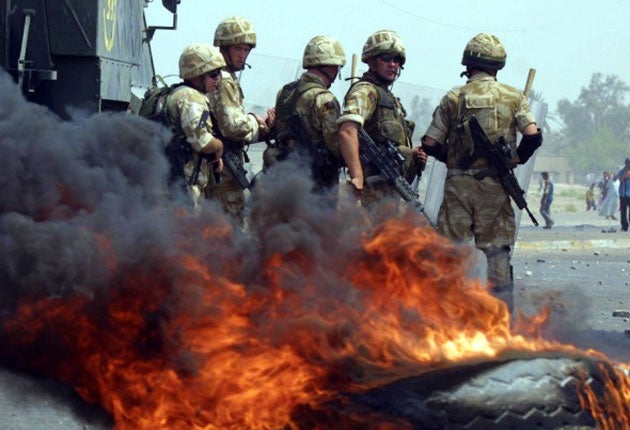Hoon 'banned armed forces from preparing for Iraq war'
Ministers wanted public kept in dark over likelihood of invasion, Lord Boyce says

Your support helps us to tell the story
From reproductive rights to climate change to Big Tech, The Independent is on the ground when the story is developing. Whether it's investigating the financials of Elon Musk's pro-Trump PAC or producing our latest documentary, 'The A Word', which shines a light on the American women fighting for reproductive rights, we know how important it is to parse out the facts from the messaging.
At such a critical moment in US history, we need reporters on the ground. Your donation allows us to keep sending journalists to speak to both sides of the story.
The Independent is trusted by Americans across the entire political spectrum. And unlike many other quality news outlets, we choose not to lock Americans out of our reporting and analysis with paywalls. We believe quality journalism should be available to everyone, paid for by those who can afford it.
Your support makes all the difference.Geoff Hoon held back military preparations for the Iraq invasion when he was Defence Secretary, because he wanted to keep the plans secret from the public, his armed forces chief has revealed.
Admiral Lord Boyce, the former Chief of the Defence Staff, said that he was blocked from ordering equipment and mobilising troops for several months in the run-up to the Iraq war. Instead, he was limited to top secret "high-level" planning within the Ministry of Defence, meaning he was left with "some very short timelines" in which to prepare troops for the invasion.
Final preparations for one army brigade were only completed the day before the invasion began. The 7th Armoured Brigade, also known as the Desert Rats, reached "full operational capability" on 19 March 2003.
"I was not allowed to speak to the chief of defence logistics," Lord Boyce told the Chilcot Iraq inquiry. "I was prevented from doing that by the Secretary of State for Defence because of the concern of it becoming public knowledge that we were planning for a military contribution." He added that there were fears that the preparations "might be unhelpful in the activity in the UN to secure a Security Council resolution".
He said that he was often told by ministers to give a more optimistic appraisal of what could be achieved. "I was taken aside from time to time and asked to make more of a glass half full rather than half-empty assessment," he said. "But my view was that I had to provide as realistic an appraisal as possible."
Permission to carry out "very limited" further preparations only came in November 2002 after pleading with ministers. "The late stage at which I was finally given authority to start mobilising the logistics organisation to get the equipment that we needed left us with some very short timelines," he said. "But those units that were going to the front of the front line on 20 March, I'm confident were properly equipped."
However, the inquiry also heard from Sir Kevin Tebbit, the permanent secretary at the Ministry of Defence during the run-up to the invasion, that problems arose in delivering body armour and protection against chemical and biological weapon attacks. He also said that while Gordon Brown, then Chancellor, did not withhold funds for the operations, the overall defence budget was "too small" to cope with the new demands.
Lord Boyce said that he expressed concerns about the legality of the war to Tony Blair as early as January 2002 and demanded a "one-liner" note from the Attorney General, Lord Goldsmith, authorising the operation. "As far as I was concerned, my constituency – my soldiers, sailors and airmen and their families – had to be told that what they were doing was legal," he said.
The inquiry heard that military planners were asked to start "ramping up" their preparatory work after Mr Blair returned from a secretive meeting with President Bush in Crawford, Texas, in April 2002. A small group drew up a variety of military options, from using support from British soldiers already in the region to the larger contribution that was eventually deployed in Iraq.
Lord Boyce also described a "dysfunctionalism" in Washington's preparations for the invasion and the "anorexic nature of the American contribution", which led to a failure to maintain order after the war. His attempts to encourage post-war planning failed. "I could not get across to them the fact that the coalition would not be seen as a liberation force and that flowers would be stuck on the end of rifles and we would be welcomed and it would all be lovely," he said.
Join our commenting forum
Join thought-provoking conversations, follow other Independent readers and see their replies
Comments